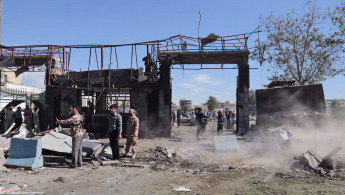Iran hints at Saudi role in deadly suicide bombing
A suicide bomber killed at least two people outside a police headquarters in the port city of Chabahar in south-eastern Iran on Thursday, its governor said.
Chabahar governor Rahmdel Bameri said many people were also wounded in the morning car bombing.
The New Arab's Arabic edition reporter in Iran said one of the casualties was a police officer, quoting local media.
"Foreign-backed terrorists kill & wound innocents in Chabahar. As we've made it clear in the past, such crimes won't go unpunished," Zarif tweeted.
"In 2010, our security services intercepted & captures extremists en route from UAE. Mark my words: Iran WILL bring terrorists & their masters to justice" Zarif added.
He was referring to the capture, trial and subsequent execution in June 2010 of Abdolmalek Rigi, the leader of the Sunni militant group Jundallah who had waged a deadly insurgency in Sistan-Baluchistan.
For his part, IRGC Spokesman Brigadier General Ramadan Sharif said the attack was executed by a terrorist groups linked to intelligence agencies in foreign countries, including Saudi Arabia.
Twitter Post
|
The province has a large, mainly Sunni Muslim ethnic Baluchi community which straddles the border and has long been a flashpoint, with Pakistan-based Baluchi separatists and jihadists carrying out cross-border attacks targeting the Shia authorities.
The province's deputy governor in charge of security, Mohammad Hadi Marashi, said multiple assailants took part in Thursday's attack.
"The terrorists tried to enter Chabahar police headquarters but they were prevented by the guards and they detonated the car bomb," he said.
State authorities did not identify who was behind the attack. No militant group immediately said it was behind the bombing.
However, the semi-official Tasnim news agency, believed to be close to Iran’s paramilitary Revolutionary Guard, blamed the attack on Ansar al-Furqan, a Sunni jihadi group.
Chabahar has a deep-water port on the Gulf of Oman and with Indian assistance Iran has been developing it as a major energy and freight hub between Central Asia and India, bypassing Pakistan.
While rare, Iran has been targeted in recent years by militant attacks.
In September, gunmen disguised as soldiers opened fire on a military parade in Ahvaz, killing at least 24 people and wounding over 60. Arab separatists and the Islamic State group both claimed the assault.
Iran's supreme leader, Ayatollah Ali Khamenei, blamed Saudi Arabia and the United Arab Emirates for the attack, allegations denied by both countries.
Ties between Saudi Arabia and Iran have been strained since Iran’s 1979 revolution, with each side competing to be the more powerful force in the Muslim world.
Tensions escalated last year. Saudi Arabia’s execution of a local Shia cleric sparked the ransacking of the Saudi Embassy in Iran by protesters. The two countries severed diplomatic and trade ties.
“We know we are a main target of Iran,” said Prince Mohammed. “We are not waiting until there becomes a battle in Saudi Arabia, so we will work so that it becomes a battle for them in Iran and not in Saudi Arabia.”





 Follow the Middle East's top stories in English at The New Arab on Google News
Follow the Middle East's top stories in English at The New Arab on Google News
![The UAE is widely suspected of arming the RSF militia [Getty]](/sites/default/files/styles/image_330x185/public/2024-11/GettyImages-472529908.jpg?h=69f2b9d0&itok=Yauw3YTG)
![Netanyahu furiously denounced the ICC [Getty]](/sites/default/files/styles/image_330x185/public/2024-11/GettyImages-2169352575.jpg?h=199d8c1f&itok=-vRiruf5)
![Both Hamas and the Palestinian Authority welcomed the ICC arrest warrants [Getty]](/sites/default/files/styles/image_330x185/public/2024-11/GettyImages-2178351173.jpg?h=199d8c1f&itok=TV858iVg)